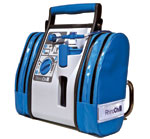Portable therapeutic hypothermia solution
Therapeutic hypothermia is gaining increasing acceptance following cardiac arrest in both the pre-hospital and hospital environments. Landmark clinical studies demonstrating that mild hypothermia lowers mortality and improves neurological outcome after successful resuscitation from cardiac arrest were published in 2002. The European Hypothermia After Cardiac Arrest (HACA) trial group demonstrated an improvement in survival to hospital discharge with favourable neurological status in cooled patients compared with normothermic patients surviving cardiac arrest (53 percent versus 36 percent respectively), with no significant adverse events from cooling. The RhinoChill intranasal cooling system is a non-invasive, portable system for transnasally cooling the head and lowering the body’s core temperature immediately following cardiac arrest, stroke or traumatic brain injury. Quick to set up and extremely easy to use, the system uses a non-invasive nasal catheter that sprays a rapidly evaporating, inert coolant liquid into the nasal cavity, a large area situated beneath the brain that acts as a heat exchanger. As the liquid evaporates, heat is directly removed from the base of the skull and surrounding tissues via conduction and indirectly through the blood via convection. The system is battery-powered, compact and does not require refrigeration, making it ideal for use in pre-hospital settings. Each coolant bottle holds enough liquid to cool a patient for 30 minutes at nominal flow, and bottles can be easily exchanged to maintain the cooling process.


